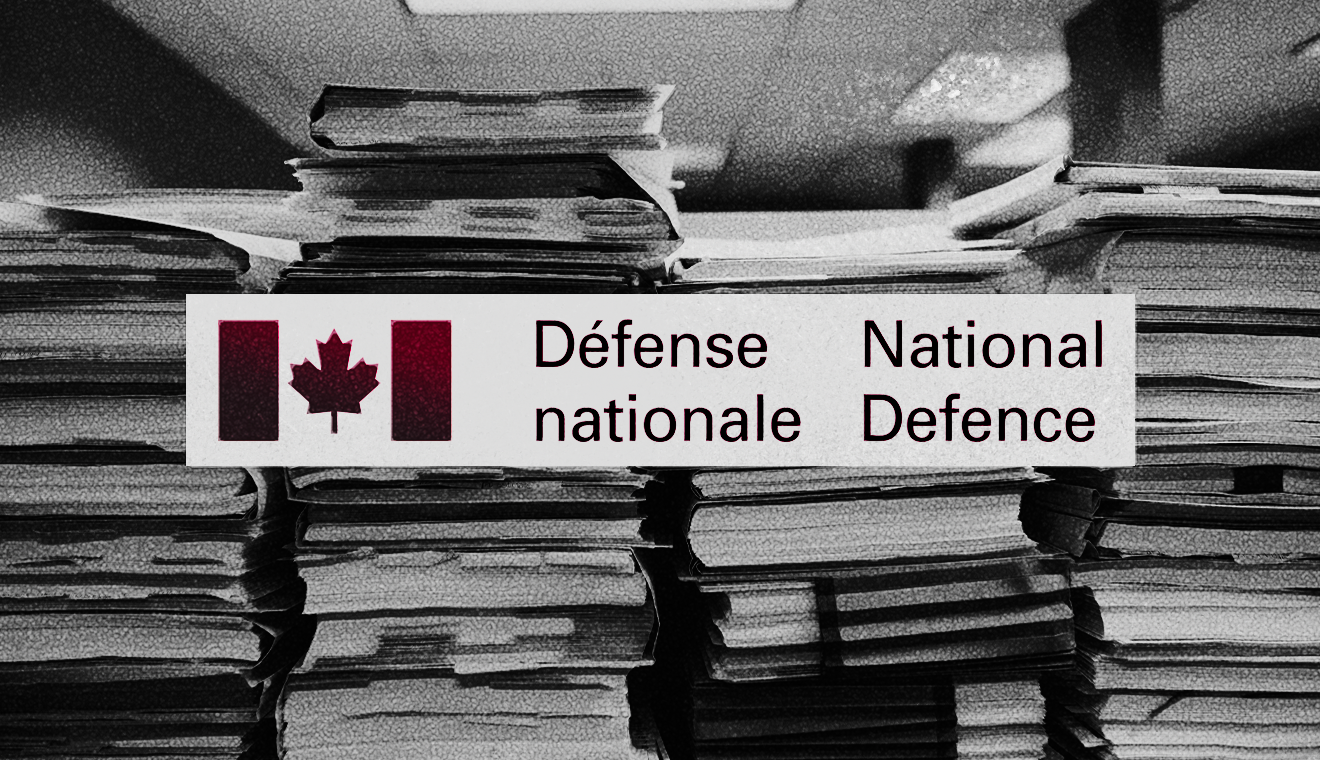Canada’s Department of National Defence (DND) is continuing to fall behind on its transparency obligations, according to a report submitted to Parliament and published days after Prime Minister Mark Carney pledged the largest spending increase for the Canadian military in decades.
DND’s 2024/25 report on its administration of the Access to Information Act (ATI) said DND completed a lower percentage of access to information requests within legislated timelines compared to the previous reporting period.
The declining response rate comes on the back of DND’s already poor and longstanding track record of failing to meet its transparency obligations.
Meanwhile, the number of complaints against the department’s handling of ATI requests that were deemed by the federal Office of the Information Commissioner (OIC) to be “well founded” more than doubled from 44 in 2023/24 to 99 in 2024/25.
A section of the 2024/25 report that outlines “Key actions taken on complaints” is a near-verbatim copy of the same section in the 2023/24 report, when there were fewer well-founded complaints lodged against the department.
Under the ATI Act, government departments are required to release documents under their control upon request by members of the public. Exemptions are made for cases where the records contain, for example, private, confidential or sensitive information.
In 2024/25, the department applied 1,449 exemptions to ATI requests, excluding 643 cases where exemptions were made to protect personal information.
The next most common exemption cited to justify censoring documents was to prevent the release of information that could “reasonably be expected to be injurious to the conduct of international affairs, the defence of Canada or any state allied or associated with Canada or the detection, prevention or suppression of subversive or hostile activities.”
DND is regularly accused of using overly broad interpretations of this exemption and others like it to excessively censor ATI release packages and maintain a culture of secrecy.
The DND report notes: “The purpose of the ATI Act is to enhance the accountability and transparency of federal institutions to promote an open and democratic society and to enable public debate on the conduct of those institutions.”
Government departments are required to provide a response to ATI requests within 30 days, or to give themselves an extension by citing justifications under the Act.
When a department fails to respond within either of those timelines, it is deemed to have refused access to the records. In such cases, however, the department is still required to give the requester a reason for the refusal, which DND often fails to do.
The report states that DND responded to 43% of ATI requests within legislated timelines in 2024/25, a decrease of 13.3% from the previous reporting period. The total number of new requests for 2024/25 increased by 6.3%.
Forty-three per cent of the delayed requests, 537 in total, were delayed by longer than a year. More than 2,000 requests were carried over from previous reporting periods, the highest number of carry-overs in the last five years.
The most common reason given by DND for failing to respond to ATI requests in a timely manner was “unavailability of key officials and difficulties in obtaining relevant information,” according to the report.
Soaring Spending
The report’s findings come after Carney’s 2025 federal budget committed $81.8 billion in military spending over five years, the largest cash injection into the military since the Korean War.
Major increases in military spending typically mean new contracts for equipment and infrastructure, which in turn attract public interest in the details about those contracts. However, such details are often not disclosed in the department’s public statements, and may only come to light through ATI requests.
For example, The Maple recently revealed through an ATI request that DND’s $43 million purchase of Israeli-made missiles also entailed plans to send dozens of Canadian troops for training in Israel, a fact not disclosed in any of DND’s public statements.
None of the Liberal government’s new military spending has been explicitly earmarked for improving the department’s ability to meet its transparency obligations under the ATI Act.
Most of the funds are targeted towards military personnel pay rises, recruitment, infrastructure, cyber defence, new armaments, developing Canada’s “defence industrial base” and military assistance to Ukraine.
The department’s report blamed DND’s failures to respond to ATI requests within legislated timelines in part on “increased media attention and public interest” in matters like COVID-19 vaccinations, the war in Ukraine, and “Unidentified Aerial Phenomena,” known more commonly as UFOs.
The department said staffing challenges and turnover also impacted its ability to meet its transparency obligations.
Both excuses for DND’s failures to meet its transparency obligations were also cited in the 2023/24 report.
A Longstanding Record
The Maple has direct experience with DND’s longstanding transparency failures.
This week, the Office of the Information Commissioner (OIC), which handles ATI-related complaints against the federal government, sent The Maple a scathing report regarding DND’s failure to respond to a request from The Maple for documents related to a contract with an Israeli pharmaceutical company.
The Maple submitted the request in June, but DND did not provide any response and did not extend the time frame in which to respond.
In response to The Maple’s complaint about DND’s failure to respond, the commissioner wrote:
“I find the delay taken by the [assistant deputy minister (ADM)] to retrieve the relevant records and respond to [Directorate Access to Information and Privacy (DAIP)] completely unacceptable. [The ADM] does not seem to understand that the Act imposes a legal obligation to respect the right of access. This is a duty that must be understood and shared by all members of the Canadian Armed Forces and public service employees serving and working under the Minister of National Defense.”
The commissioner continued:
“DAIP is not the only one responsible in ensuring that the Act is respected; it is a departmental and collective responsibility. I urge, again, the Minister to remind his public officials, as well as military personnel, of their responsibility in providing timely access to information to Canadians.”
The OIC ordered the minister to release the requested documents within 36 days.
This was not the first time, however, that the OIC issued stern words to DND regarding its failure to respond to ATI requests.
In 2023, the OIC found that DND’s “unacceptable” handling of access to information requests undermined the credibility of Canada’s transparency system.
The commissioner’s report was prepared for The Maple after this publication filed a complaint over DND’s handling of an ATI request submitted in August 2022.
In a separate case, The Maple requested documents in the fall of 2021 concerning a George Washington University report that showed a far-right group in Ukraine had bragged online about receiving training at a NATO military academy.
DND did not release the requested documents for over a year, and only did so after The Maple filed a complaint with the OIC.
DND further delayed the release of the documents for more than a week after the OIC advised The Maple that the documents should have been delivered. An OIC officer told The Maple that DND had “responded to your request” on Oct. 13, 2022.
When The Maple informed the OIC officer that the documents had not in fact been delivered, the officer said DND told him the documents had been sent through regular mail. The documents were finally delivered electronically on Oct. 25, 2022.
In February 2024, Information Commissioner Caroline Maynard told the House of Commons Committee on National Defence that DND was often simply ignoring requests made under the ATI Act.
On two occasions, she said, the department also ignored her orders to release records. But officials face few consequences for flouting their transparency obligations, and it would be difficult to create a system that would sanction those responsible, she added.
In a report published in November 2024, the House of Commons committee made several recommendations, including that the federal government develop a plan for DND to comply with all outstanding orders issued by the Information Commissioner.
As noted by Ottawa Citizen defence reporter David Pugliese, DND sometimes makes improbable claims that requested documents don’t exist.
For example, Pugliese noted, the department claimed that not a single document was sent to then-defence minister Anita Anand during a four-month period covering the Liberal government’s official announcement that it would procure F-35 fighter jets from American arms company Lockheed Martin.
As well, DND withheld documents regarding an $80 billion warship deal for nearly three years, and when the department finally released the records, the cost figures were censored, Pugliese noted.
In March 2023, Pugliese reported that he had requested a July 7, 2021 document that contained advice for Canada’s then-chief of defence staff, Gen. Wayne Eyre, from a sexual misconduct survivors’ group on how to finesse his public statements about unethical behaviour. The document also assured Eyre that the group was not seeking harsh punishment for senior officers found guilty of wrongdoing.
DND told Pugliese that despite a thorough search, the requested document could not be found.
But that claim was false: Pugliese had been sent a copy of the document by “individuals concerned about how the Canadian military has dealt with ongoing sexual misconduct scandals.”
After being informed that the Citizen had a copy of the document, DND claimed that a mistake had been made, and insisted the error was “an isolated incident.”
More recently, the records showing plans to send Canadian troops for missile training in Israel were only released to The Maple following an order by the OIC and after DND had failed to respond to the request for nine months.
Other examples of DND failing to comply with the ATI Act are published on the OIC website.
One case, published in June 2024, concluded that DND failed to respond to a request for documents relating to Operation Aegis, Canada’s effort to evacuate Afghans with “significant and/or enduring relationship with the Government of Canada, along with their accompanying family members.”
“The Information Commissioner found that the delay taken by the Office of Primary Interest, Canadian Forces Intelligence Command, to retrieve all relevant records was unacceptable,” the report said.
“The Information Commissioner was notified that National Defence would not be providing a response by the date set out in the order, further stating that National Defence would be initiating judicial proceedings once the final report was issued.”
Besides failing to release documents requested through ATI requests, DND’s media relations team is also notoriously slow at responding to basic questions from journalists.
The Maple emailed the department on September 26 asking for confirmation that the Canadian Armed Forces missile training sessions took place as planned in Israel last year and for information about the costs involved.
Despite media relations officer Cheryl Forrest repeatedly promising to provide a statement over the course of more than three weeks, no response was ever sent.







